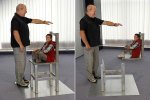This can’t be good news for Obama.
AT FIRST sight, the idea that Europe has anything to teach America about tackling unemployment seems preposterous. America has some of the most flexible labour markets in the developed world, while continental Europe, in the popular imagination, is a sclerotic place with powerful unions, rigid labour markets and high entrenched joblessness. Over the past quarter-century America’s unemployment rate has averaged 5.8%, compared with 9.5% in France and 9.1% in Germany.
This picture may be changing. Although output in the euro area has fallen as much as in America, the unemployment rolls have not grown as much. The euro-wide jobless rate is up by less than a third, compared with a doubling across the Atlantic. At 9.7%, euro-area unemployment is high, but slightly lower than in America, where new figures due on November 6th were expected to show joblessness hitting double digits.

Well, then again it might. I am convinced that our President is out to build a more left leaning European socialist state than the right leaning socialist state that we have now. So really, it’s hard to tell. But what I mean, really mean, is that The Economist is actually calling him out on it!
The United States has put in place a hefty fiscal stimulus, but relatively little of that money has gone into labour-market policies—schemes to slow firing, boost hiring or support the jobless.
…
Europe’s policymakers, in contrast, appear to have a more coherent strategy: one which uses government money to subsidise a shortened work week, cuts labour costs and, in a few cases, offers tax subsidies to support new jobs. The OECD says 22 out of 29 of its member countries have extended support for workers on furlough, and 16 have cut payroll taxes and other social contributions
Now, before we get all “crazy talk” here, I wanna point out that shortened work weeks and paid furloughs are NOT my ideas of economic good ideas. And as I was reading my edition of The Economist at my favorite Thai place, I just about lost my belly. See, I mostly think that The Economist calls itself The Economist because they wanna trick conservatives into reading leftist views. Almost as if…. But then, in a last second Hail Mary, The Economist pulls off the improbable:
Consider the subsidising of shorter work weeks, continental Europe’s most dramatic innovation. By in effect paying firms to hoard workers, governments have slowed the rise in joblessness and helped prop up consumer confidence and demand. In a vicious temporary slump, driven by a credit crunch and the collapse of global spending, such subsidies make short-term sense. But they prop up demand by fossilising a country’s job structure and preventing the shift of workers from industries with excess capacity (like carmaking) to more promising ones. That ossification will surely come to haunt continental Europe. And in an economy like America’s, where the end of the debt-fuelled consumer-spending binge is forcing big structural shifts, it would be insane.
And the revolution over at The Economist continues:
That is why Europe’s governments are right to focus on waiving or reducing their high payroll taxes, especially for additional hires. And it is why American proposals to finance an extension of unemployment insurance with payroll taxes are misguided. Heavy labour taxes are one reason why Europe entered the downturn with far higher unemployment than America. Lightening that burden would do most to boost jobs—on both sides of the Atlantic.
Thai tasted a whole lot better today. And it was just some more bad news for Obama.
 It always has. And as long as personal liberties are enforced, it always will.
It always has. And as long as personal liberties are enforced, it always will.



